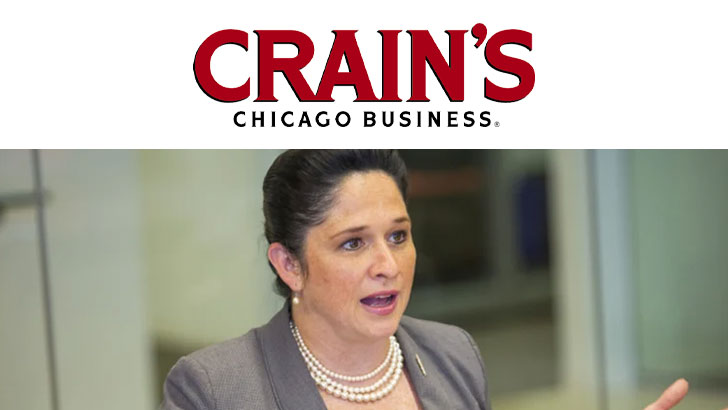Op-Ed: Points in favor of state bill payments reform

NEWSRADIO WJPF INTERVIEW WITH SUSANA MENDOZA [AUDIO]
marzo 1, 2022
Op-Ed: Before City Hall launches this $1.5B bond issue, stop and think
octubre 4, 2024— Crain’s Chicago Business – Letter to the Editor | Mendoza, S. —
Illinois Comptroller Susana Mendoza says the state needs to stop giving politically connected wealthy private lenders the chance to make 12% profits on the backs of taxpayers.
I’d have liked the chance to explain to columnist Joe Cahill before his column ran («Don’t let the state backslide on bill payments,» Feb. 28) why I think we need to reform the state program that offers politically connected wealthy private lenders the chance to make 12% profits on the backs of state taxpayers.
Here are some of the points I would have made:
- It is Illinois taxpayers, not the government, who ultimately pay the 12% interest pocketed, in most cases, by the politically connected private lenders who benefit from the current flawed system.
- The fact that taxpayers had to shell out more than $1 billion in late payment interest penalties under the program proves it does not work as a deterrent to keep the state from paying its bills late.
- Cahill asserts that the Vendor Payment Program and the Prompt Payment Act offer future protections if the state budget goes off the rails. I argue Illinois’ history proves these programs had the opposite effect. They provided an expensive crutch for state government to continue hobbling down the path of fiscal malpractice, harming taxpayers without having to make corrective decisions on the budget.
- The same arguments that financial analysts and pundits use about the state needing to watch costs and live within its means—when the subject is worthwhile programs proven to help state residents—should also apply when it’s a government program that benefits the politically connected wealthy elite.
- I do not suggest abolishing interest on late bills. I suggest lowering the rate from 12% a year down to something more reasonable, like 3%, or a formula tied to the rate of inflation.
- The nonprofits and small businesses that care for the state’s most vulnerable have had no greater advocate in state government than me. When I took office in 2016, nursing homes and hospice centers were waiting six months or more to be paid, while the administration speed paid connected consultants, and yes, the connected private lenders mentioned in Cahill’s column. I reversed that and moved the state’s struggling small businesses and nonprofit social service and human service providers to the front of the line. The “slow-walking” of payments to vendors is what I encountered when I took office and I ended that indefensible practice.
- Yes, the state will inevitably have economic downturns that will challenge its ability to pay bills on time. But forcing taxpayers to pay politically connected private lenders 12% interest to float loans to those providers is hardly the best or only tool the state has to protect the interests of the service providers.
- Illinois is finally positioned to replenish the Rainy Day Fund that the previous administration emptied. State Rep. Mike Halpin has introduced a bill, HB 4118, that would automatically put money into the Rainy Day Fund and the Pension Stabilization Fund when the state’s backlog of bills is less than $3 billion. I am a strong proponent of this measure. Gov. J.B. Pritzker proposes putting nearly $900 million into the Rainy Day Fund. Having the Rainy Day Fund as a backstop that can help during emergencies—as other states do—is a better path forward than the private-lender-enrichment option.
- We have other safety-net tools that were either not used or did not exist during the self-inflicted budget impasse of 2015-2017, nor during the last economic downturn prior to the pandemic, including interfund borrowing or borrowing internally from the treasurer at low interest and paying the Illinois Treasury back instead of paying Wall Street. Under these tools, the state can access billions of dollars to pay bills without having to owe 12% interest per year to private lenders. In fact, under these tools, the state invests in itself, providing a win for taxpayers. These tools make it less likely that vendors will see the kinds of delays they faced when I first took office.
- Most small businesses and social and human service providers never saw a penny of that 12% interest. Shouldn’t they have been the ones to see the benefit, instead of the politically connected private lenders getting richer? This is no longer a dichotomy between enriching politically connected private lenders and service providers closing their doors. The state has moved beyond that.
- These issues are less complicated when you put taxpayers first, as I have. It all comes down to profit and loss. In this case, the wealthy elite profited. Taxpayers lost. I’m trying to change that moving forward.
SUSANA MENDOZA
Illinois comptroller
Stay up to date
Sign up to be a part of Team Susana today! You will receive notifications on activities, announcements and more.


